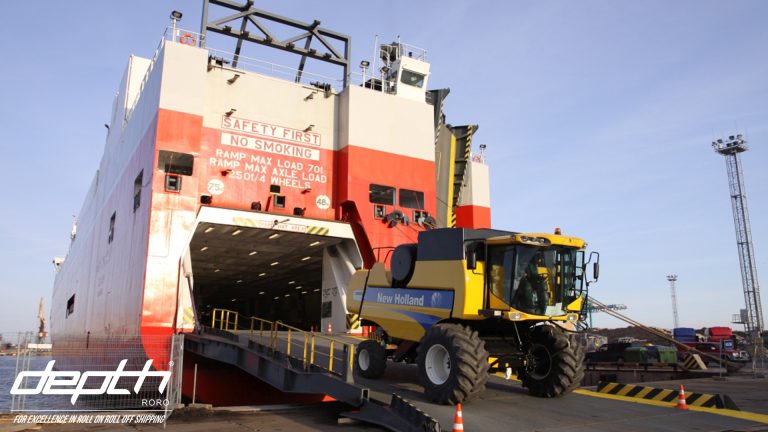RoRo Shipping of Agricultural & Forestry Machinery
Request a Quote
Roll On Roll Off Shipping of Agricultural & Forestry Machinery

Our experience in planning, preparing and using RoRo shipping to transport all manner of new and used agricultural and forestry equipment is second to none.
Depth RoRo acts for manufacturers, contractors, dealers and primary producers themselves.
We are fully conversant with all types of agricultural and forestry equipment. Whether you require the transportation of a specific harvester, tractor, combine, feller buncher, or implement, our team is well equipped to plan and execute cost effective shipment. Our extensive database of equipment dimensions also means that rarely, if ever, will you need to supply specifications to us.
Biosecurity risk and customs clearance requirements are all able to be handled seamlessly in house by our team.
Preparing agricultural & forestry machinery for RoRo Shipping
Operational working height must be considered at the time of booking. If a unit can be lowered at the time of securing but must be raised during manoeuvring the upper height must be the declared height at the time of booking. Some machinery fitted with booms, such as excavators and cranes, have a maneuvering height which is higher than the parked height so the operating height is crucial when stowing the cargo on board the RoRo ship. Failure to declare such heights may result in cargo being short shipped.
Tracked cargo should be presented for loading with the correct operational track tension and the tracks in good working order.
Hydraulic sag may occur with cargo such as screeners/crushers/excavators/bulldozers. All hydraulic rams should be locked to prevent sag. If sag occurs, carriers can remeasure the cargo based on the larger dimensions and bill additional freight accordingly. Depth RoRo will be forced to adjust our price accordingly.
Machinery must be presented for shipment in good running and self-starting order with fully functioning steering and braking systems including parking brakes.
All tyres should be inflated to the manufacturer’s recommended operating pressure. Any cargo with flat or cut tyres will be refused by the carriers.
Machinery should have sufficient fuel load to allow for loading and discharge operations, and potential standby idling time. We suggest that a fuel load be at least 10% but no more than 25% for this purpose.
Any fuel and oil leaks must be fixed before delivery of the cargo for shipment. Carriers can reject machinery with leaks on safety and environmental grounds. If leaks occur during transit carriers can charge cleaning fees for the vessel and terminal.
On the day of vessel loading, mechanical assistance cannot be guaranteed if your machine will not start. Most carriers are able to provide some basic jump start assistance but this cannot be relied upon.
If the machine is complicated to operate and/or has electrical isolation switches, the shipper must provide detailed operating instructions inside the cabin and to the Depth RoRo operations team before delivery to the port. The operating instructions should also include a 24 hour phone number for technical support if required.
Cargo missing fuel and oil caps can be rejected by carriers.
All items in or on the cargo should be properly secured so they cannot move and potentially cause damage during transportation.
Non-operating machinery can sometimes be shipped on MAFI Trailers. However freight will be calculated at the static cargo rate.
Some countries have stringent Quarantine Regulations so machinery must be delivered for shipment in a very clean condition. These regulations can include re-export of your cargo at your expense. Brown Marmorated Stink Bug is another significant quarantine risk that must be dealt with prior to shipment of RoRo cargo during the season. Depth RoRo can assist with pre-shipment cleanliness inspections (if required), washing and fumigation of cargo in most main ports however extra charges for these services will apply.
Freight is calculated on the overall dimensions of the cargo. To keep your freight costs to a minimum, it is important to reduce the dimensions where possible. As long as it doesn’t impact the safe and reliable operation of the cargo, parts or accessories such as radio aerials, beacon lights, exhaust stacks, or any other protrusions should be removed, cylinders retracted, and mirrors turned in. This is a non exhaustive list and are examples of what you need to consider when presenting your cargo for shipment.
We strongly recommend that you take out marine insurance on your cargo in the event of any mishap during transportation. We can quote you on this aspect on request if you can provide us with the value of the cargo. It is important to note that most underwriters require a condition report prior to shipping in the unfortunate event of a claim.
If these cargo preparation guidelines are not followed then short shipment and extra expenses can be incurred to your account.

